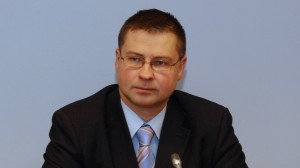
The unpopular budget has severely strained Prime Minister Valdis Dombrovskis' coalition and incurred widespread criticism and protest. Photo by Aivis Freidenfelds, State Chancellery.
RIGA — The cleaning crew hadn’t even finished tidying up Latvia’s parliamentary assembly hall, and the clerks time to deliver the papers to the president’s office, before speculation spread that the agonizing 2010 budget would have to be amended.
After Tuesday’s marathon legislative session that ended in the approval of the most challenging budget in the Baltic nation’s history, many observers said that the budget was unrealistic and would require more changes. Pēteris Krīgers, head of the Latvian Free Trade Union Association, reportedly told Latvian Radio that next year’s revenues were out of some fantasy-land. “They are the government’s rosy dreams that it will have to give up after it once it’s clear that they aren’t coming true,” he said.
Elina Egle, head of an employers’ union, said the budget would fall short of its targets as soon as the first quarter. Though typically all national budgets change throughout a year, such commentary in Latvia is particularly sensitive given that the government has yet to convince international lenders that the 2010 budget is a viable document.
Other criticism that the budget was unrealistic points to the likelihood that more businesses will turn to the gray economy, dealing a further blow to the government’s revenues and to a possible decision by the Constitutional Court on pensions that could force the government to raise social payments.
However, Prime Minister Valdis Dombrovskis was quick to dispel speculation that the 2010 budget, which in the past three months has caused tremendous embarrassment for Latvia and triggered numerous demonstrations, would be subjected to wholesale amending. “I see no reason why any amendments should be made to the budget right after it was approved,” he told LNT television in an interview Wednesday.
Still, the prime minister added that changes could eventually be made “in the positive direction.” Pressure to implement changes is likely to be immense. Some observers suggest that Andris Šķēle, head of the People’s Party, the largest in the ruling coalition, is trying to convince Dombrovskis of the need to revise economic policy. The two men were scheduled to meet this week.
Although the prime minister said that the two were not scheduled to discuss the budget, Šķēle’s relentless criticism of the document and his strong of soapbox speeches on the economy have led many to believe that he will be a driving force in forming economic policy in the run-up to the national elections in 2010. According to one report, Šķēle said on Nov. 30 that the budget was “getting worse by the day.”
“The budget is based on false assumptions and norms, which will not facilitate an economic revival,” Šķēle told the local press.
Šķēle is trying to distance the People’s Party, whose popularity ratings are also low, from this unpopular budget but at the same time maintaining the image of an active, influential figure who knows how to rescue the country from its worse recession on record.
Dombrovskis said Wednesday that Šķēle’s attacks on the budget contained the “expected amount of populism.” Regardless, with the leader of the largest party assailing the budget, which has yet to be signed into law and needs the approval of the International Monetary Fund and the European Union, Latvia’s ruling coalition is skating on thin ice.













Dombrovskis’ meeting with Skele this morning brought mediocre results.